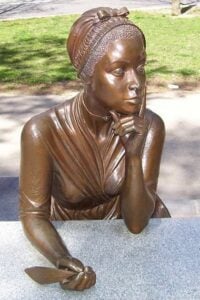 |
| Portrait of Phillis Wheatley used as the frontispiece of her book. Attributed to Scipio Moorhead. Library of Congress |
September 1, 1773: Phillis Wheatley published Poems on Various Subjects, Religious and Moral. She was only 20 years old, but more importantly, it was the first published book of poetry by an African-American.
She had been born in West Africa and brought over as a slave when she was a young girl. She was purchased by a Boston family, who taught her to read and write, and eventually gave her her freedom.
On a 1773 trip to London with her master's son, seeking publication of her work, Wheatley met prominent people who became patrons. The publication in London of her poetry brought her fame both in England and the American colonies. It was praised by George Washington, and the Lord Mayor of London, who gave her a gift copy of Paradise Lost.
Thomas Jefferson was not kind to her work or to any poetry by blacks. He wrote, "Religion indeed has produced a Phyllis Whately [sic] but it could not produce a poet. The compositions published under her name are below the dignity of criticism."
Black literary scholars from the 1960s to the present in critiquing Wheatley's writing have noted the absence in it of her sense of identity as a black enslaved person. "A number of black literary scholars have viewed her work—and its widespread admiration—as a barrier to the development of black people during her time and as a prime example of Uncle Tom syndrome, believing that Wheatley's lack of awareness of her condition of enslavement furthers this syndrome among descendants of Africans in the Americas." [source]
But other critics consider her work fundamental to the genre of African-American literature. In 2002, the scholar Molefi Kete Asante listed Phillis Wheatley as one of his 100 Greatest African Americans. Wheatley is featured, along with Abigail Adams and Lucy Stone, in the Boston Women's Memorial, a 2003 sculpture on Commonwealth Avenue in Boston, Massachusetts. In 2012, Robert Morris University named the new building for their School of Communications and Information Sciences after Phillis Wheatley, and Wheatley Hall at UMass Boston is named for her.
In The Trials of Phillis Wheatley, Henry Louis Gates Jr. explores America's first black poet and her encounters with the founding fathers and how that shaped black literary tradition. Gates posits that Jefferson, unlike his contemporaries Ben Franklin and George Washington, refused to acknowledge her gifts as a writer, and that repudiation eventually inspired generations of black writers to build a body of literature in their efforts to prove him wrong.
Though she continued to publish in magazines after the book's publication and made some money from publications, it was not enough to have a good life. Wheatley was emancipated by her masters shortly after the publication of her book, and she married John Peters, a poor grocer. They fell into debt and Peters abandoned her when she was pregnant. She died in childbirth at 31 years old, in poverty and obscurity.
 |
| Statue in Boston |
On being brought from Africa to America
'TWAS mercy brought me from my Pagan land,
Taught my benighted soul to understand
That there's a God, that there's a Saviour too:
Once I redemption neither sought nor knew,
Some view our sable race with scornful eye,
"Their colour is a diabolic die."
Remember, Christians, Negroes, black as Cain,
May be refin'd, and join th' angelic train.
A Hymn to the Evening
Soon as the sun forsook the eastern main
The pealing thunder shook the heav'nly plain;
Majestic grandeur! From the zephyr's wing,
Exhales the incense of the blooming spring.
Soft purl the streams, the birds renew their notes,
And through the air their mingled music floats.
Through all the heav'ns what beauteous dies are spread!
But the west glories in the deepest red:
So may our breasts with ev'ry virtue glow,
The living temples of our God below!
Fill'd with the praise of him who gives the light,
And draws the sable curtains of the night,
Let placid slumbers sooth each weary mind,
At morn to wake more heav'nly, more refin'd;
So shall the labours of the day begin
More pure, more guarded from the snares of sin.
Night's leaden sceptre seals my drowsy eyes,
Then cease, my song, till fair Aurora rise.
Visit our website at poetsonline.org
No comments:
Post a Comment
* * All comments must be approved by the site administrator before appearing in order to prevent spam.